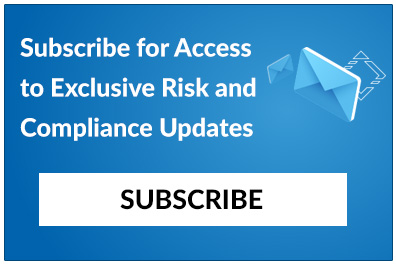Home/ Blog / 3 IT Policies That Can Enable Better Compliance Management
The focus of most risk management teams is to ensure that their organization can survive the pandemic and continue to deliver essential services. The pandemic has also exposed the vulnerabilities of many financial institutions when it comes to IT infrastructure, compliance management, and risk management. The financial sector is different from most other sectors of the economy because most of its work involves private and confidential information. This includes the financial details, loans, requests, private details, and much more for both the businesses and the people that use banking and financial services.
Most businesses simply required their employees to have access to internet from home to enable work from home policies, but banking and financial institutions did not have the luxury of allowing employees to work from home through their own devices and internet connections. The cybersecurity risks involved in enabling work from home for employees is too large.
What compounds this problem is that many banks and financial institutions are still using legacy systems to manage risk, compliance, and other important financial domains. It is possible to work from home while ensuring data security and compliance with banking regulations but there was never a major need for it until now, which is why many businesses were unprepared when the pandemic reached the country.
Every risk and compliance strategy that will be planned from now on will factor in the pandemic – all the plans, investments, and decisions taken will be taken to ensure that financial institutions are not unprepared again. Here are some IT policies and tools which can help banks create an IT infrastructure that ensures business continuity, compliance, and risk mitigation.
We can expect financial sector businesses to focus on providing secure laptops and other computing devices to employees in the future. It is possible to make laptops as secure as desktops with comprehensive IT policies and device security tools. Share on XSecure Devices
Many banks and financial institutions were still using desktop computers. It may seem odd, as most other businesses exclusively use laptops, but there are several reasons that financial sector businesses may prefer desktop computers. The legacy systems used in financial institutions require an extensive implementation process. Desktop computers are easier to maintain because most of them use universal system parts. If a system is malfunctioning, it is inexpensive and easy to order the malfunctioning part and replace it on the spot. Laptops may require specialized parts and are harder to repair.
Desktop computers also added a layer of security. Since it was not possible to take the computer systems outside the office unnoticed, it ensures that no computers with important data are misplaced or stolen. However, this security became a hindrance due to the pandemic.
We can expect financial sector businesses to focus on providing secure laptops and other computing devices to employees in the future. It is possible to make laptops as secure as desktops with comprehensive IT policies and device security tools.
Cloud Solutions
The inability to use legacy systems when outside the office network is another major vulnerability that the pandemic has exposed. Finance professionals need access to bank data, compliance management systems, risk management tools, and other banking tools to work. We can expect banks and financial institutions to start using cloud solutions to ensure that all the tools will be available to employees no matter where they are working from. The treasury department looked into the use of cloud solutions in the financial sector (PDF Link) and their research revealed that most financial institutions were planning to use more cloud solutions in the future. The pandemic has only increased the importance of such solutions.
The process of implementing cloud solutions is relatively painless and inexpensive. Unlike legacy systems, which took an enormous amount of time and money to implement, cloud systems can be set up in a few days and at a very low cast. There are several factors that make the implementation so easy for banks. Since the service is on the cloud there is no reason to purchase and install new hardware. The maintenance is handled by service providers. Banks can continue using their existing systems without any major disruptions until the cloud implementation is complete. The monthly payment models of these cloud solutions are also easier to manage for smaller institutions.
Secure VPNs
VPNs (virtual private networks) have traditionally been used by people to hide their identities or appear to be from another geographical location. However, there is another major business advantage to VPNs – security. Most of the websites we use are secured via SSL encryption. This means that both us and the server have a unique key which allows both to decrypt the data being sent and received. If someone intercepted the data, they would not be able to make any sense of it unless they had the key to decrypt the data.
The problem is that while most websites and services are secured via SSL and other measures, our networks and devices are often not as secure. There are zero-day exploits (so-called because the exploit has recently been discovered and thus has not been fixed) and many other attacks which aim to access any part of our computer that is not secure. If a website is not properly using SSL certificates or an instant messaging solution has a vulnerability, there is a chance that the data can be intercepted.
VPNs encrypt all the data coming in and out of the device. A key to decrypt this data is generated for us and for the VPN service provider. Our encrypted data is sent to the VPN’s server, the server then decrypts it, and sends it further to our intended recipient. This adds an extra layer of security to the whole process. Banks and financial institutions can easily procure secure VPN solutions from the multitude of VPN providers on the internet.
Are you looking for more ways to strengthen your organization when it comes to compliance, risk management, and cybersecurity? Get in touch with our experts to see demos of solutions that can help your organization.
Request a Demo
Complete the form below and our business team will be in touch to schedule a product demo.
By clicking ‘SUBMIT’ you agree to our Privacy Policy.



